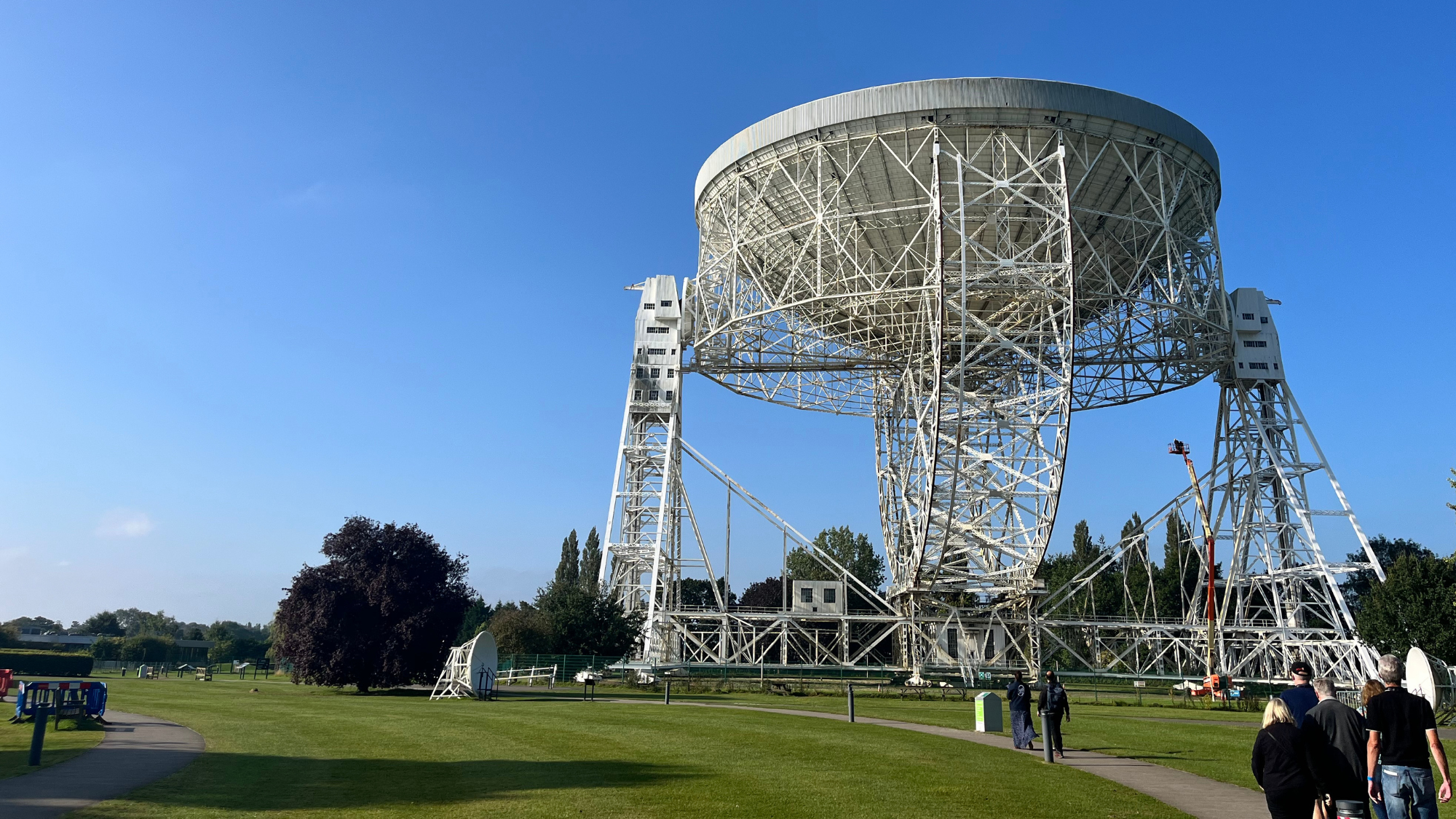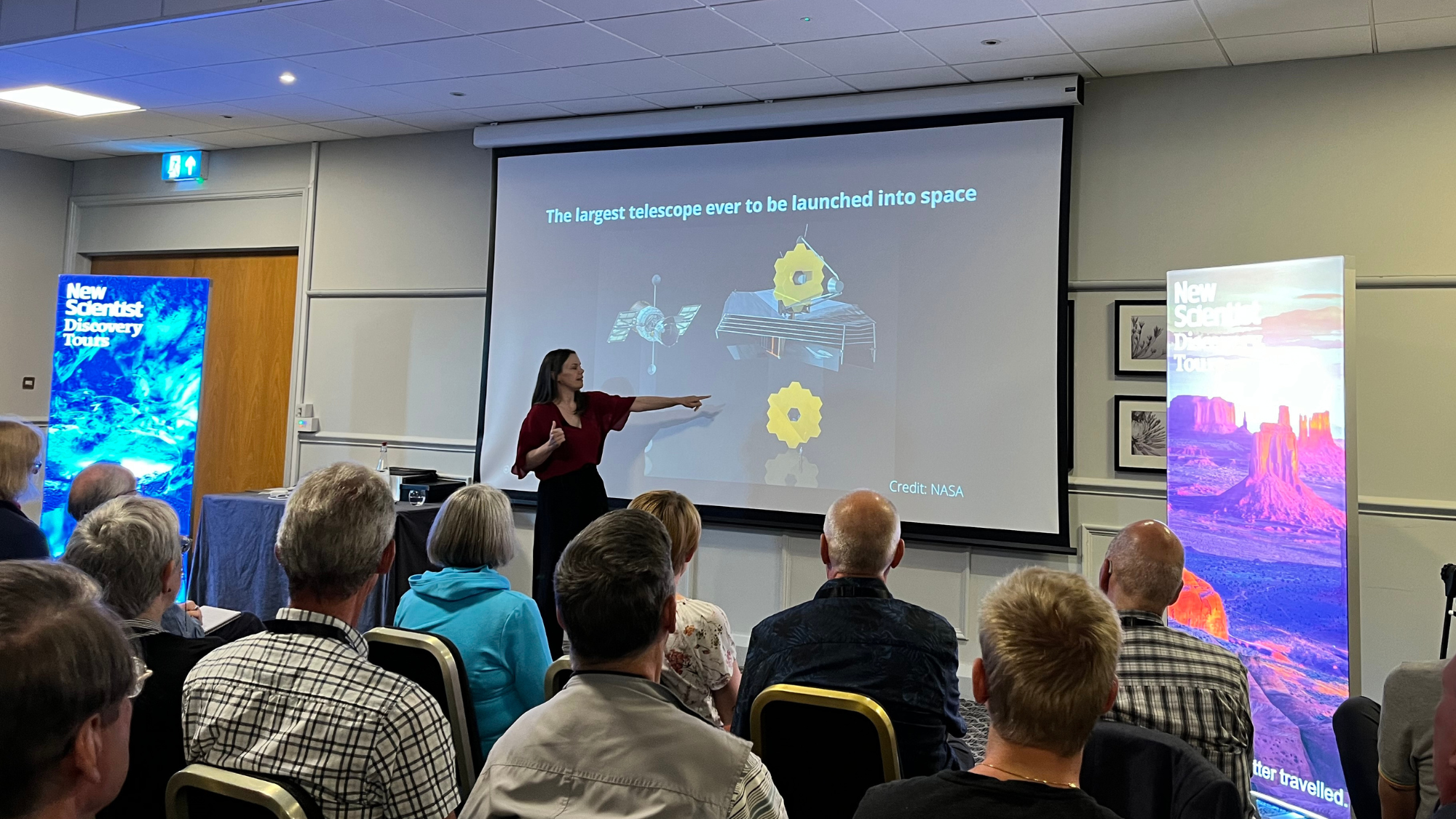Mysteries of the Universe Weekender
The New Scientist's two-day event features stargazing, talks and a tour of the UK's largest radio telescope


A free daily email with the biggest news stories of the day – and the best features from TheWeek.com
You are now subscribed
Your newsletter sign-up was successful
Mind-blowing. Those are the two words I'd use to describe the "Mysteries of the Universe" weekender discovery tour, hosted by New Scientist. Over two days in the Cheshire countryside, a group of space enthusiasts, myself included, were treated to fascinating talks from some of the UK's top astrophysicists, plus a guided tour around the world's third largest radio telescope. We were even lucky enough to get clear skies for stargazing. At a time when our planetary problems can seem insurmountable, this trip was a welcome reminder that the universe is vast and full of wonder beyond my imagination.
My home for the weekend was the De Vere Cranage Estate Hotel, a Grade II listed property located roughly halfway between Manchester and Stoke-on-Trent and large enough to host around 150 attendees. After checking in on Friday evening, we filed into the property's conference room to be greeted by the event's host: Stuart Clark, a renowned science communicator, a fellow of the Royal Astronomical Society, and a cosmology writer for New Scientist. Aside from being our point of contact for the weekend, Clark had the herculean task of providing us with a brief "introduction to the universe".
"Let's start with some mind-blowers," Clark said to my delight. An image – a large sphere covered in orange and blue dots, and smudges – flashed on the screen. This, Clark explained, was the cosmic microwave background – a snapshot, taken by the European Space Agency's now-defunct Planck telescope, of radiation left over from the Big Bang. It captures light emitted when the universe was just a newborn, some 13.8 billion years ago. The different colours represent temperature variations, with colder areas blue, warmer areas red. Over billions of years the colder, denser areas would go on to nurture stars, galaxies and planets, one of which would eventually be home to mankind. In other words, the blueprint for the cosmos we live in today, made up mostly of dark matter and energy that scientists haven't yet figured out how to measure, was drawn up very, very early. "That's what the universe looks like," Clark said. "Now we just have to understand what it's telling us."
The Week
Escape your echo chamber. Get the facts behind the news, plus analysis from multiple perspectives.

Sign up for The Week's Free Newsletters
From our morning news briefing to a weekly Good News Newsletter, get the best of The Week delivered directly to your inbox.
From our morning news briefing to a weekly Good News Newsletter, get the best of The Week delivered directly to your inbox.
Indeed. This quandary carried us through drinks and dinner. My randomly selected tablemates included a tech CEO, a biologist and the head of a charity foundation – a fantastic mix of characters, all science nerds with big questions about the origins of the universe. I felt right at home. The evening ended with stargazing on the hotel's front lawn, led by Clark and made all the more interesting by his deep knowledge of the night sky and all its main characters.

Astrophysicist Emma Curtis Lake giving a presentation during the two-day event
The next morning we boarded coaches and made the 15-minute journey to Jodrell Bank, a 35-acre UNESCO World Heritage Site and home to the Lovell Telescope, the UK's largest radio telescope – I could see the Lovell looming in the distance, before we got there, its enormous white bowl rising 90 meters above the ground. We arrived before the centre officially opened to visitors and were treated to a detailed tour of the compound, where researchers have been using radio and radar to map the unseen cosmos since the 1940s – from supermassive black holes to rotating pulsar stars. It was the highlight of the trip, an immersion in British scientific history and an outing I'll never forget.
The rest of the weekend did not disappoint with captivating talks about the hunt for Earth's twin planet and how artificial intelligence is transforming astrophysics for the better. There were seven lecturers, my personal favourite was Dr. Emma Curtis Lake, an astrophysicist at the University of Hertfordshire, who is using the James Webb Space Telescope to study how galaxies behaved in the early universe. This telescope "can see further back in time than any other," Curtis Lake said. "What the Hubble Telescope could do in hundreds of years, Webb can do in tens of years." For example, since its launch in 2021, it has found the most distant black hole in the known universe and captured images of ancient galaxies that shocked scientists with their inexplicable brightness.
Despite the advanced nature of these topics, the talks were neither too complicated nor pedestrian. I was challenged, but never felt I was in over my head, and was certainly never bored. I returned to London bursting with questions but oddly reassured. Knowing so many phenomena remain unexplained filled me with a strange sense of hope: we haven't figured it all out yet and there are still puzzles to be solved and secrets to be uncovered. How very exciting.
A free daily email with the biggest news stories of the day – and the best features from TheWeek.com
Jessica Hullinger was a guest of New Scientist Discovery Tours Mysteries of the Universe: Cheshire, England weekender, price from £859. The next one, scheduled for summer 2025, costs £999.
Jessica Hullinger is a writer and former deputy editor of The Week Digital. Originally from the American Midwest, she completed a degree in journalism at Indiana University Bloomington before relocating to New York City, where she pursued a career in media. After joining The Week as an intern in 2010, she served as the title’s audience development manager, senior editor and deputy editor, as well as a regular guest on “The Week Unwrapped” podcast. Her writing has featured in other publications including Popular Science, Fast Company, Fortune, and Self magazine, and she loves covering science and climate-related issues.
-
 Political cartoons for February 21
Political cartoons for February 21Cartoons Saturday’s political cartoons include consequences, secrets, and more
-
 Crisis in Cuba: a ‘golden opportunity’ for Washington?
Crisis in Cuba: a ‘golden opportunity’ for Washington?Talking Point The Trump administration is applying the pressure, and with Latin America swinging to the right, Havana is becoming more ‘politically isolated’
-
 5 thoroughly redacted cartoons about Pam Bondi protecting predators
5 thoroughly redacted cartoons about Pam Bondi protecting predatorsCartoons Artists take on the real victim, types of protection, and more
-
 All mixed up: the year ahead in cocktail and bar trends
All mixed up: the year ahead in cocktail and bar trendsthe week recommends It’s hojicha vs. matcha, plus a whole lot more
-
 Travel for all: 6 of the world’s most accessible destinations
Travel for all: 6 of the world’s most accessible destinationsThe Week Recommends Experience all of Berlin, Singapore and Sydney
-
 The 8 best TV shows of the 1960s
The 8 best TV shows of the 1960sThe Week Recommends The standout shows of this decade take viewers from outer space to the Wild West
-
 The year’s ‘it’ vegetable is a versatile, economical wonder
The year’s ‘it’ vegetable is a versatile, economical wonderthe week recommends How to think about thinking about cabbage
-
 The biggest box office flops of the 21st century
The biggest box office flops of the 21st centuryin depth Unnecessary remakes and turgid, expensive CGI-fests highlight this list of these most notorious box-office losers
-
 Mail incoming: 9 well-made products to jazz up your letters and cards
Mail incoming: 9 well-made products to jazz up your letters and cardsThe Week Recommends Get the write stuff
-
 The 8 best superhero movies of all time
The 8 best superhero movies of all timethe week recommends A genre that now dominates studio filmmaking once struggled to get anyone to take it seriously
-
 One great cookbook: Joshua McFadden’s ‘Six Seasons of Pasta’
One great cookbook: Joshua McFadden’s ‘Six Seasons of Pasta’the week recommends The pasta you know and love. But ever so much better.
